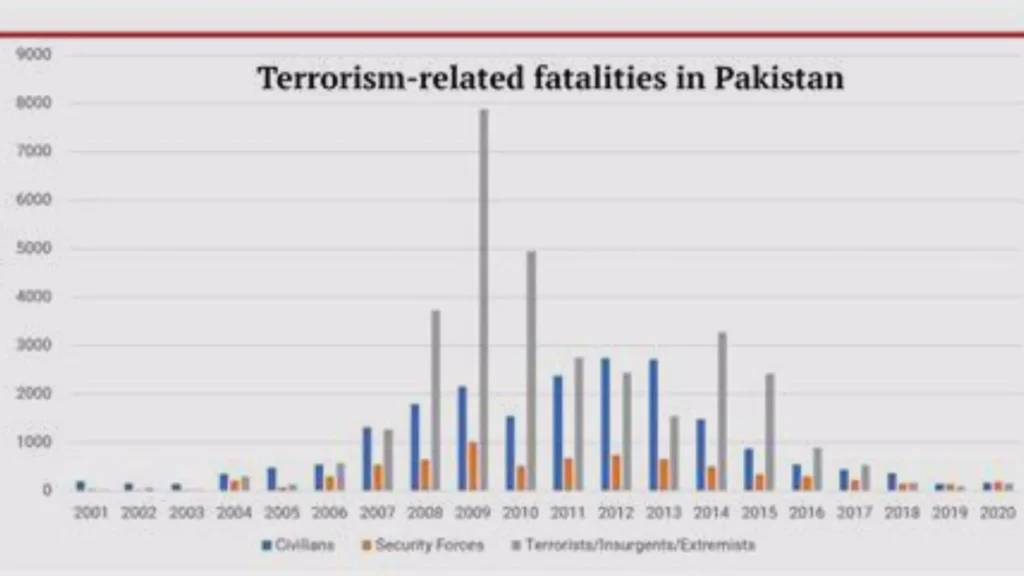Uncover the complex landscape of terrorism in Pakistan, delving into its origins, impact, and ongoing challenges. Gain insights into the socio-political dynamics and counterterrorism efforts shaping the nation’s security narrative.
Outline:
I. Introduction
A. Definition of terrorism
B. Brief overview of terrorism in Pakistan
C. Thesis statement
II. Historical Context of Terrorism in Pakistan
A. Origins of terrorism in the region
B. Major historical events contributing to terrorism
C. Evolution of terrorist groups and tactics
III. Causes of Terrorism in Pakistan
A. Socio-economic factors
B. Political instability and governance issues
C. Religious extremism and sectarianism
D. External influences and geopolitical factors
IV. Types of Terrorism in Pakistan
A. Domestic terrorism
B. Sectarian violence
C. Insurgency in border regions
D. State-sponsored terrorism allegations
V. Impact of Terrorism in Pakistan
A. Human casualties and displacement
B. Economic repercussions
C. Social and psychological effects
D. Impact on international relations and security
VI. Counterterrorism Efforts in Pakistan
A. Military operations against terrorist groups
B. Intelligence and surveillance measures
C. Counter-extremism policies and initiatives
D. International cooperation and support
VII. Challenges in Combating Terrorism in Pakistan
A. Complexity of the terrorist threat landscape
B. Internal divisions and political obstacles
C. Role of non-state actors and external support
D. Balancing security measures with human rights concerns
VIII. Case Studies of Major Terrorist Incidents in Pakistan
A. Examples of significant terrorist attacks
B. Responses and aftermath of selected incidents
IX. Future Prospects and Recommendations
A. Emerging trends and potential threats
B. Strategies for addressing root causes of terrorism
C. Enhancing counterterrorism capabilities and cooperation
D. Conclusion and final recommendations
Essay: Terrorism in Pakistan
Introduction
Terrorism, characterized by acts of violence and intimidation to achieve political, religious, or ideological goals, has plagued Pakistan for decades. From domestic insurgencies to sectarian violence and international terrorism, Pakistan has been a battleground for various extremist groups. This essay provides an in-depth analysis of terrorism in Pakistan, examining its historical roots, underlying causes, diverse manifestations, and ongoing efforts to combat it.
Historical Context of Terrorism in Pakistan
Pakistan’s history of terrorism can be traced back to its origins as a nation-state in 1947. The partition of British India led to communal violence and displacement, laying the groundwork for sectarian tensions and identity-based conflicts. Over the years, Pakistan has witnessed the rise of various terrorist groups, including militant factions involved in the Afghan-Soviet war, sectarian outfits targeting religious minorities, and separatist movements in Balochistan and Khyber Pakhtunkhwa provinces.
Causes of Terrorism in Pakistan
Several factors contribute to the prevalence of terrorism in Pakistan. Socio-economic disparities, poverty, and lack of development opportunities exacerbate grievances and provide fertile ground for recruitment by extremist groups. Political instability, corruption, and governance failures weaken state institutions and undermine efforts to address security challenges. Religious extremism and sectarianism fueled by radical ideologies further exacerbate tensions and violence, leading to a cycle of radicalization and conflict. Additionally, external influences, including regional geopolitics and the Afghan conflict, contribute to Pakistan’s security challenges.
Types of Terrorism in Pakistan
Terrorism in Pakistan takes various forms, including domestic insurgencies, sectarian violence, and international terrorism. Domestic insurgencies, such as the Tehrik-i-Taliban Pakistan (TTP), target the Pakistani state and seek to establish Islamic law in the country. Sectarian violence between Sunni and Shia Muslim groups has claimed thousands of lives and destabilized communities. Insurgencies in border regions, particularly along the Afghan border, have fueled cross-border militancy and terrorism. Moreover, allegations of state-sponsored terrorism, including support for militant proxies, have further complicated Pakistan’s security landscape.
Impact of Terrorism in Pakistan
The impact of terrorism in Pakistan is profound and far-reaching. Human casualties, displacement, and trauma have devastated communities and disrupted daily life. Economic repercussions, including loss of investment, damage to infrastructure, and decline in tourism, have hindered Pakistan’s development prospects. Socially, terrorism has fostered fear, mistrust, and division, undermining social cohesion and stability. Internationally, Pakistan’s image has been tarnished by associations with terrorism, leading to strained relations with key allies and partners.

Counterterrorism Efforts in Pakistan
Pakistan has undertaken various counterterrorism measures to address the threat posed by extremist groups. Military operations, such as Operation Zarb-e-Azb and Operation Radd-ul-Fasaad, have targeted terrorist strongholds and dismantled insurgent networks. Intelligence and surveillance measures have been enhanced to disrupt terrorist plots and apprehend suspects. Additionally, counter-extremism policies and initiatives aim to promote tolerance, counter radicalization, and rehabilitate former militants. International cooperation, including support from the United States, China, and regional partners, has bolstered Pakistan’s counterterrorism capabilities.
Challenges in Combating Terrorism in Pakistan
Despite efforts to combat terrorism, Pakistan faces numerous challenges. The complexity of the terrorist threat landscape, including the presence of multiple militant groups with varying agendas, makes it difficult to eradicate terrorism entirely. Internal divisions, political obstacles, and corruption within state institutions hamper effective governance and counterterrorism efforts. The role of non-state actors and external support from neighboring countries further complicates Pakistan’s security dynamics. Balancing security measures with human rights concerns remains a challenge, raising questions about the legitimacy and efficacy of counterterrorism tactics.
Case Studies of Major Terrorist Incidents in Pakistan
Numerous major terrorist incidents have occurred in Pakistan, underscoring the severity of the threat and the resilience of extremist groups. From the attack on the Army Public School in Peshawar in 2014 to the bombing of the Marriott Hotel in Islamabad in 2008, these incidents have left a lasting impact on Pakistani society and highlighted the urgent need for robust counterterrorism measures.
Future Prospects and Recommendations
Looking ahead, Pakistan faces significant challenges in combating terrorism and maintaining security. Addressing the root causes of terrorism, including socio-economic disparities, political instability, and religious extremism, is essential to long-term peace and stability. Enhancing counterterrorism capabilities, promoting regional cooperation, and addressing grievances through inclusive governance and development initiatives are crucial steps towards mitigating the threat of terrorism in Pakistan.
Conclusion
In conclusion, terrorism remains a persistent threat to Pakistan’s security and stability, fueled by a combination of socio-economic, political, and ideological factors. While significant strides have been made in countering terrorism, challenges persist, requiring sustained efforts and international cooperation. By addressing root causes, strengthening institutions, and fostering inclusive governance, Pakistan can mitigate the threat of terrorism and build a more secure and prosperous future for its citizens.






